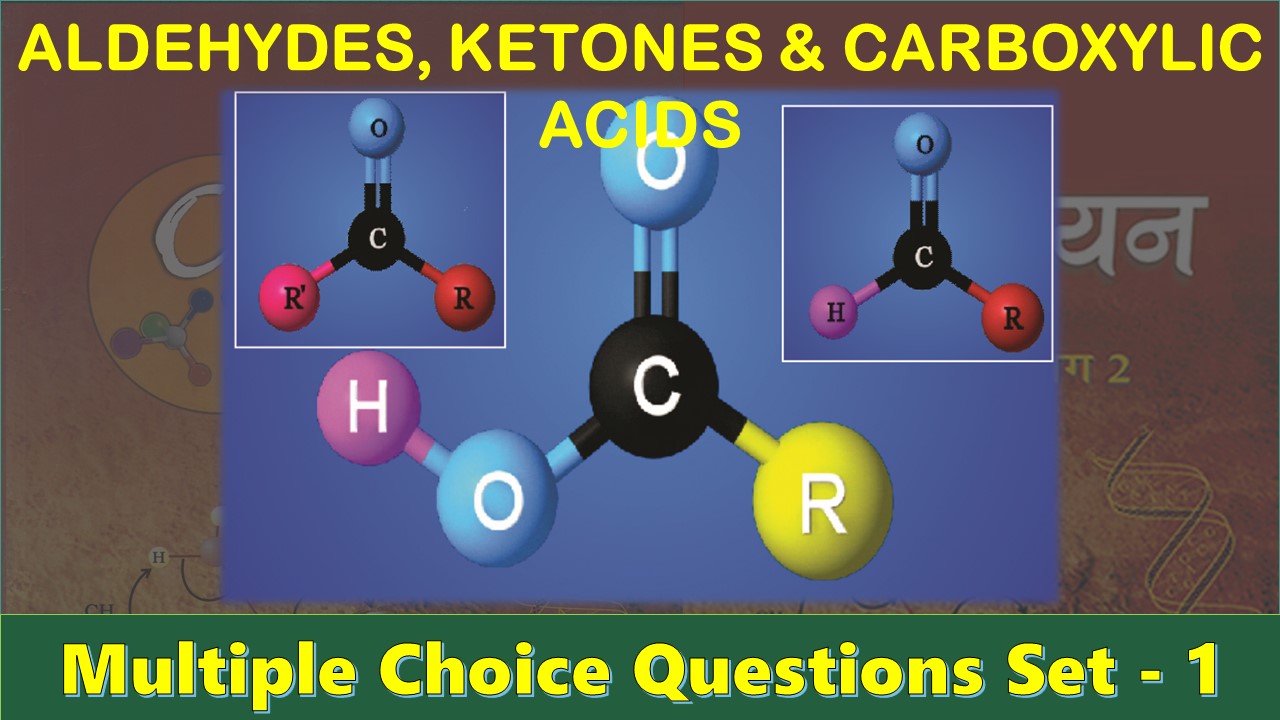CBSE Class 12 Aldehydes Ketones and Carboxylic Acids with Answers Multiple Choice Questions with Answers. MCQ Questions Class 12 Aldehydes Ketones and Carboxylic Acids with Answers with Answers Is Prepared Based on Latest Exam Pattern. Students can solve NCERT Class 12 Aldehydes Ketones and Carboxylic Acids with Answers MCQs with Answers to know their preparation level.
Students who are searching for NCERT MCQ Questions for Class 12 Aldehydes Ketones and Carboxylic Acids with Answers with Answers are compiled here to get good practice on all fundamentals. Know your preparation level on MCQ Questions for Class 12 Aldehydes Ketones and Carboxylic Acids with Answers with Answers. You can also verify your answers from our provided MCQ Class 12 Aldehydes Ketones and Carboxylic Acids with Answers with Answers. So, ace up your preparation with MCQ of Class 12 Chemistry Examinations.
MCQ Questions Class 12 Aldehydes Ketones and Carboxylic Acids with Answers - Set - 1
Question 1:
CH3CHO and C6H5CH2CHO can be distinguished chemically by
(a) Benedict’s test
(b) iodoform test
(c) Tollens’ reagent test
(d) Fehling’s solution test
Correct Answer – (B)
Question 2:
The product formed by the reaction of an aldehyde with a primary amine is
(a) carboxylic acid
(b) aromatic acid
(c) Schiff ’s base
(d) ketone
Correct Answer – (C)
Question 3:
Which of the following reagents would distinguish cis-cyclopenta-1,2-diol from the trans-isomer?
(a) MnO2
(b) Aluminium isopropoxide
(c) Acetone
(d) Ozone
Correct Answer – (C)
Question 4:
The oxidation of toluene to benzaldehyde by chromyl chloride is called
(a) Etard reaction
(b) Riemer–Tiemann reaction
(c) Wurtz reaction
(d) Cannizzaro’s reaction
Correct Answer – (A)
Question 5:
In the reaction, CH3CN + 2H → HCl Ether → X→ Boiling H2OY; the term Y is
(a) acetaldehyde
(b) ethanamine
(c) acetone
(d) dimethylamine
Correct Answer – (A)
MCQ Questions Class 12 Aldehydes Ketones and Carboxylic Acids With Answers
Question 6:
Reaction of a carbonyl compound with one of the following reagents involves nucleophilic addition followed by elimination of water. The reagent is
(a) hydrazine in presence of feebly acidic solution
(b) hydrocyanic acid
(c) sodium hydrogen sulphite
(d) a Grignard reagent
Correct Answer – (A)
Question 7:
The correct statement regarding a carbonyl compound with a hydrogen atom on its alphacarbon, is
(a) a carbonyl compound with a hydrogen atom on its alpha-carbon rapidly equilibrates with its corresponding enol and this process is known as carbonylation
(b) a carbonyl compound with a hydrogen atom on its alpha-carbon rapidly equilibrates with its corresponding enol and this process is known as keto-enol tautomerism
(c) a carbonyl compound with a hydrogen atom on its alpha-carbon never equilibrates with its corresponding enol
(d) a carbonyl compound with a hydrogen atom on its alpha-carbon rapidly equilibrates with its corresponding enol and this process is known as aldehyde-ketone equilibration
Correct Answer – (B)
Question 8:
Reaction between benzaldehyde and acetophenone in presence of dilute NaOH is known as
(a) Aldol condensation
(b) Cannizzaro’s reaction
(c) Cross Cannizzaro’s reaction
(d) Cross Aldol condensation
Correct Answer – (D)
Question 9:
Ketones [RCOR1] where R = R1 = alkyl group. It can be obtained in one step by
(a) oxidation of tertiary alcohol
(b) reaction of acid halide with alcohols
(c) hydrolysis of esters
(d) oxidation of primary alcohol
Correct Answer – (A)
Question 10:
Which one of the following can be oxidised to the corresponding carbonyl compound?
(a) 2-Hydroxypropan
(b) ortho-Nitrophenol
(c) Phenol
(d) 2-Methyl-2-hydroxypropane
Correct Answer – (A)
- NCERT Solutions Class 11 Chemistry Chapter 1 : Some Basic Concepts of Chemistry
- NCERT Solutions Class 11 Chemistry Chapter 2 : Structure Of The Atom
- NCERT Solutions Class 11 Chemistry Chapter 3 : Classification of Elements and Periodicity in Properties
- NCERT Solutions Class 11 Chemistry Chapter 4 : Chemical Bonding and Molecular Structure
- NCERT Solutions Class 11 Chemistry Chapter 5 : States of Matter
- NCERT Solutions Class 11 Chemistry Chapter 6 : Thermodynamics
- NCERT Solutions Class 11 Chemistry Chapter 7 : Equilibrium
- NCERT Solutions Class 11 Chemistry Chapter 8 : Redox Reactions
- NCERT Solutions Class 11 Chemistry Chapter 9 : Hydrogen
- NCERT Solutions Class 11 Chemistry Chapter 10 : The s-Block Elements
- NCERT Solutions Class 11 Chemistry Chapter 11 : The p-Block Elements
- NCERT Solutions Class 11 Chemistry Chapter 12 : Organic Chemistry: Some Basic Principles and Techniques
- NCERT Solutions Class 11 Chemistry Chapter 13 : Hydrocarbons
- NCERT Solutions Class 11 Chemistry Chapter 14 : Environmental Chemistry




